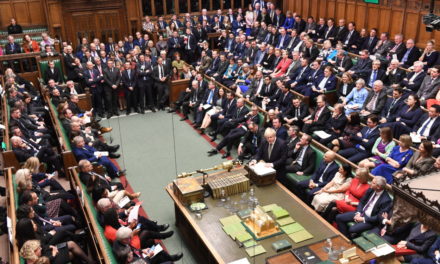President Macron’s agenda of reform to create a fiscal union can be conceived, after twenty years from the historic agreement with Germany, as the culmination of the Euro as a political project. Or, it could also be viewed as a yet another alternative policy instrument to try and override the practical limitations of the Maastricht fiscal criteria, and offset the EU’s defective monetary policy implant. The proposal may well betray the political will to maintain the EU’s economic misadventure without a full political integration – a necessary requirement for all optimal currency areas to operate – already sharply evident in the member state’s lack of an adjustable exchange rate, flexible independent monetary policy and discretionary fiscal policy. This, which is thus aggravated by an insufficient flexibility in labour and product markets and the German led Fiscal Compact (2011), has sofar created asymmetric shocks within the Eurozone, by creating the conditions for high unemployment and more complex economic and socially unacceptable contrasts and constrains, particularly evident in the southern economies of Europe, now being permanently uncompetitive vis a vis their northern counterparts.
The need for a closer fiscal union for the euro area and of more government spending has also been supported recently by the outgoing ECB President Mario Draghi, who urged a closer fiscal union and common budget for the euro area, adding that, without it, the currency zone would remain “a fragile construction” and that more government spending could “greatly help” the central bank’s mission. Indeed with its Communication published at the beginning of this year, the Commission has already made the case for a gradual transition to more harmonization in EU tax policy and has opened the debate on how to reform its decision-making procedures and speed up the legislative process. It effectively makes the case for a gradual transition in four steps from unanimous agreement amongst the Member States to Qualified Majority Voting (QMV), under the ordinary legislative procedure in areas of shared EU taxation policy by the end of 2025. In the words of EU budget Commissioner Pierre Moscovici, ”The EU has had a role in taxation policy since the origins of the Community six decades ago. Yet, if unanimity in this area made sense in the 1950’s, with six member states, it no longer makes sense today”.
Clearly the political debate on this has a long way to go. Germany in particular, has traditionally always rejected talks of loosening government budget and have, up until recently, opposed Mr Draghi’s ECB plan to reactivate quantitative easing measures within the Eurozone. In the draft budget presented by Finance Minister Olaf Scholz at the beginning of September, Mr. Scholz told the German Parliament that Germany will “use the low interest rates for an expansive economic policy…within a framework in which we do not create additional debt”. This, would in theory, be in line with the federal budget pursued without any fresh borrowings, also referred as “Black zero”, which the German government has adhered to since 2014. However, as the Bundesbank’s last report revealed a huge U-turn in favour of negative interest rates, this unorthodox monetary policy tool, designated to spur economic growth through spending and investment, reflects evidence of a weakening and downturn in the German economy. This news would also throw the current Brexit hiatus into the spotlight, as the Federation of German Industries (BDI) stated that a no deal Brexit would push Germany to zero growth for the year, making the British export market assume a far larger importance to the German economy. This view was then confirmed by the Ifo (Institut of Economic Research) which stated that it sees a recession this year, with Tobias Hentze, an economist at the Ifo, commenting that the Finance Ministry could “only avoid new debts with tricks”. It remains to be seen if President’s Macron tough line on Brexit will suit Germany any longer at this stage.
As a solution to their economic woes, German policy makers will allegedly find its own ways to bend its “Black Zero” fiscal constraints. One way would mean the creation of at-arms-length public financing vehicles, or public special purpose vehicles (SPV) which would be off the Government’s balance sheet, their debt apparently not counting toward the overall Federal deficit. By going off-balance sheet, Germany would signal that it wants to continue with austerity in the Eurozone while retaining a weak Euro. More importantly, Germany could get paid for a fiscal stimulus to finance their budgetary objectives and maintain its artificial competitive interests within the EU which other member states have gratuitously allowed to sustain. It is not far-fetched to presume that, as this solution would be domestic and not pan-European, Germany’s partners and its Southern European neighbours, that have been limited into taking actions towards fiscally stimulating their economies sofar, would follow suit. Questions would arise as to how much ground on fiscal expansion Germany and its Northern partners would concede in terms of the ensuing investment led boom. Northern Europeans would still want to apply austerity and reduce the size of this potential boom in Southern Europe, but not in their own countries. Preserving the unity of the Eurozone through the potential creation of German controlled and SPV inspired safe bonds for the ECB could be advocated to preserve the unity of the Eurozone. At the same time, this potential pooling of the members states by default would be a great enabler of deeper economic and fiscal union.
This potential scenario sharply points to Great Britain’s position in terms of its present negotiating stance vis a vis the EU and in particular to questions relating to the retention of its independent tax policy arrangements. By not repealing Art. 4 of the present Withdrawal Agreement, negotiated by the previous Government, the UK would effectively be exposed to the Member states’ voting rights during the transition period. The current European Commission proposal would, through the application of the so-called Passarelle clause, enable EU members to remove the National Veto on EU Tax Policies and substitute Qualified Majority Voting (QMV), without going through Treaty change. The EU would therefore introduce a new ability for a majority of member states (weighted by size and population) to decide upon tax matters. This would include financial transaction taxes and corporation tax. Given the Withdrawal Agreement contains Art.4, the UK is, if it signs and ratifies the draft agreement, exposed to the Member States voting to extend EU control over its tax policy. It is instructive to note that an indication of future dangers in this vital sphere was one of the reasons given by former Prime Minister David Cameron for holding the Referendum in the first place and, in line with the Lisbon Treaty Passarelle system, he vetoed the Fiscal Compact. A further reason for making sure that the UK leaves the EU at the end of October, come what May..



